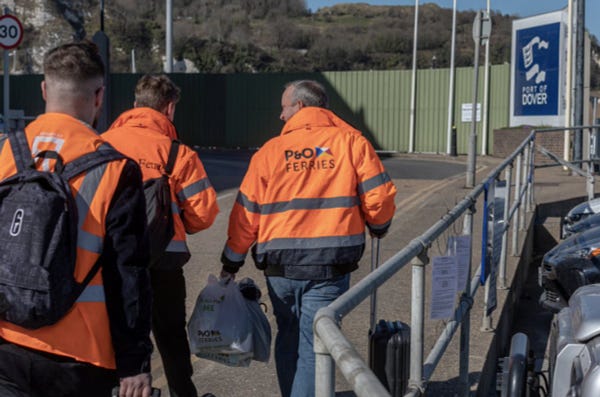Will P&O be the latest dominant brand to ride out the outrage and get away with murder?
"As a society we are going to have to realise, in the corporate world just as in the political, that rhetoric and righteous outrage isn’t enough to make dominant brand behave."
We have all seen the disturbing news of P&O Ferries sacking 800 people with no notice last week and the justifiable outrage it caused. We have all seen protests from unions on the docks, while captains refuse to leave their ships or let new crews (of replacement agency workers cheaply commissioned from overseas) onboard against a backdrop of unified condemnation from across the media, social media and the political spectrum.
But the real questions is, will this abhorrent treatment of workers have a meaningful long-term impact on P&O Ferries’ brand and profit? Sadly, I suspect it won’t. Time and time again we have seen big businesses bully workers and customers and get away with it.
This is particularly true where a brand dominates a certain market, in which case condemnation alone is not enough. Are consumers likely to risk lateness, or even unemployment, to wait for the next ferry rather than get on a P&O one? Are freight companies going to endanger their already over-pressured supply lines to punish another company? I suspect the answer to both these questions is ‘no’.
The government – the only entity with absolute power to influence the situation- appears reluctant to close these loopholes (and ‘fire and rehire’ is just one of many) - so how can consumers, media or campaigners ever hope to have a real, direct influence on brand behaviour?
In recent years, we’ve witnessed mass pandemic sackings from Weatherspoons, Amazon’s mass-exploitation of workers, RyanAir double down on decades of customer service horror stories, Google slyly but – it would seem- fittingly disavow its promise not to be evil, and Brewdog allegedly mistreat its own staff, undercut its supporters, and mislead the general public among a series of misdemeanours.
Even Facebook, perhaps the most scandal-riven of Big Tech’s ‘four horses of the apocalypse’ oligopoly, is seemingly riding out its own bad PR with a simple rebrand.
History is littered with examples, but even in the age of ‘cancel culture’ a mere PR scandal does not have the same foundation-shaking impact on a brand that dominates a particular market.
We are all complicit. A company does something dreadful and we say or think ‘I will never give XXXXX my business again’ but within weeks or months, sometimes days – whether through necessity or convenience- we’re drawn back.
And these brands know this is the case: in fact they rely on it. We joke that P&O’s PR department were first to go, but more accurately, they probably took the view that as long as their ferries are running, people won’t stop using them when there are so few other options, however bad the PR. So, in pursuit of cost cuts and long-term financial salvation, they decided the short-term outrage must be worth it.
And so it will prove. As a society we are at some point going to have to realise, in the corporate world just as in the political, that rhetoric and righteous outrage isn’t enough to make dominant brand behave. If things are ever going to change, then PR needs to be channelled into a very clear purpose, whether that’s pressure on governments to change the law, intervene, or suffer at the ballot box.




